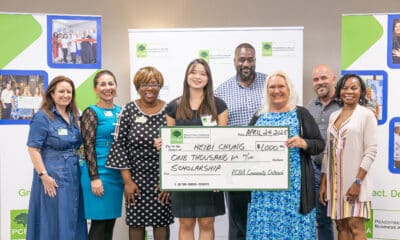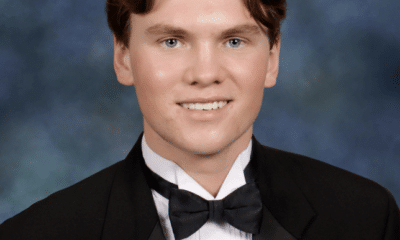Community
Recreational Soccer Club Celebrates 50 Years of Play
Published
4 months agoon

According to physicians, educators and child psychologists, there are myriad reasons parents encourage their young children to play soccer:
- Physical fitness: Soccer is a fast-paced sport that can help improve cardiovascular health, muscular strength, flexibility and endurance.
- Motor skills: Soccer involves running, kicking, dribbling and passing, which can help develop balance, agility and coordination.
- Socialization: Soccer can help children make friends from different backgrounds and cultures.
- Teamwork: Soccer is a team sport that teaches children the value of cooperation and working together towards a common goal.
- Life skills: Soccer can help children develop discipline, perseverance and resilience.
- Emotional intelligence: Soccer can help children develop empathy and emotional intelligence.
- Stress reduction: Playing soccer can help reduce stress and anxiety by releasing endorphins that elevate mood.
- Confidence: Consistent practice and dedication can help children build confidence and overcome obstacles.
- Gender equality: Participating in sports like soccer can help break down gender stereotypes.
- Enjoyment: Soccer can help encourage children to enjoy their childhood and stay in school.
It’s for those objectives and more that members of the Peachtree Corners Football Club (PCFC) are working so hard to sustain and grow their program.
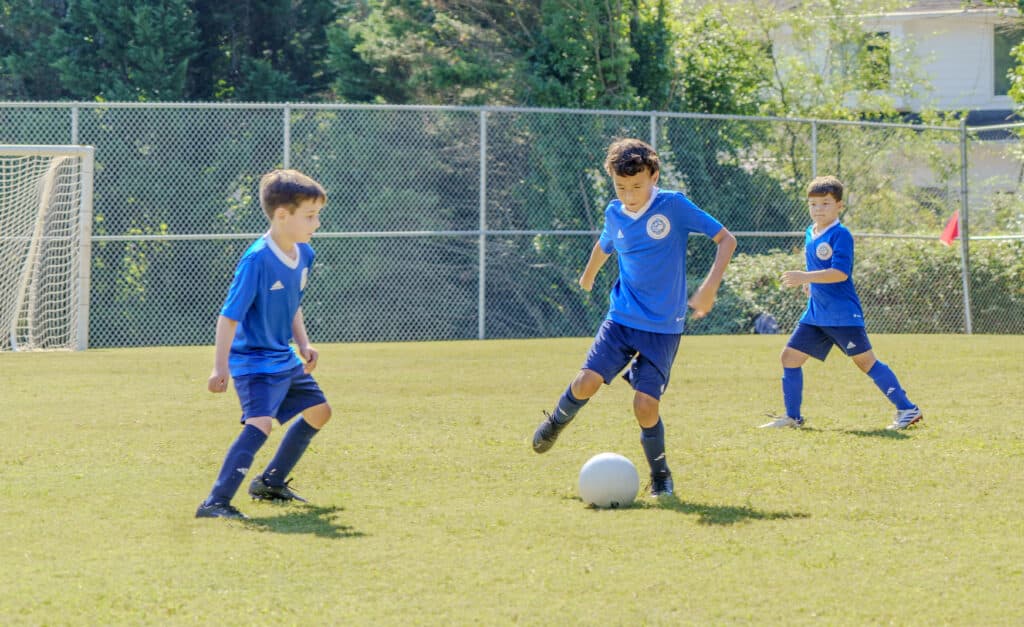
A growing community
Nearly three years ago, three local parents had the idea to build an organization for their children to reap the benefits of recreational soccer.
“We found out that we were linked to the athletic club called Peachtree Booster Club,” said Gavin Meech, a club committee member, parent coach and member of the small group that revitalized the soccer program. “It’s sort of an overarching group that also looks after the roller hockey at Pinckneyville Park in Norcross.”
They realized that back in 1975, a youth soccer program called the Jones Bridge Soccer Club was formed at Jones Bridge Park. Now renamed the Peachtree Corners Football Club, the parents decided to put the time and energy into revitalizing — and growing — the decades-old program.

In February 2022, the three coaches had 170 kids. The program now has nearly 300 kids across 30 teams. The club emphasizes community involvement, with over 5,000 volunteer hours annually from parents and coaches. Challenges include managing growth and ensuring sustainability, though the club aims to expand its field space and engage more local businesses for partnerships.
The organization will soon celebrate 50 years of providing youth recreational level soccer to the local community in the southwest corner of Gwinnett County. And registration for the upcoming season is nearly full, highlighting the need for continued community support and involvement.

Bringing new energy to an old club
Initially, the group faced challenges in forming the soccer club, including linking with the Peachtree Booster Club and learning administrative tasks.
“That first season was a steep learning curve, and we ended up, I think, with about 170 kids,” said Meech. “So we were driving around Peachtree Corners, sticking the little signs anywhere that we were legally allowed. A few of us were grabbing anybody that would slightly suggest they would help by being a parent coach and things like that.”
Fast forward to this past season where there were just under 300 kids and 30 teams.

“We are now oversubscribed,” he added. “Our return rate is in excess of 80% of the kids and their families. So, it’s really become something that once they join, they return, and through word of mouth, more want to join.”
The club is community-centric, with kids from local schools like Simpson, Berkeley Lake and Cornerstone taking part. Volunteers naturally step forward and get involved, with no formal process.
“[Rapid growth] is a great problem to have. So we’re working with [Gwinnett County Parks and Recreation] at the moment to try and see if we can gain more field space,” Meech said. “We started to utilize the big field near the Aquatic Center. It’s similar in size to Jones Bridge field, but it’s got a slightly different classification at the moment.”
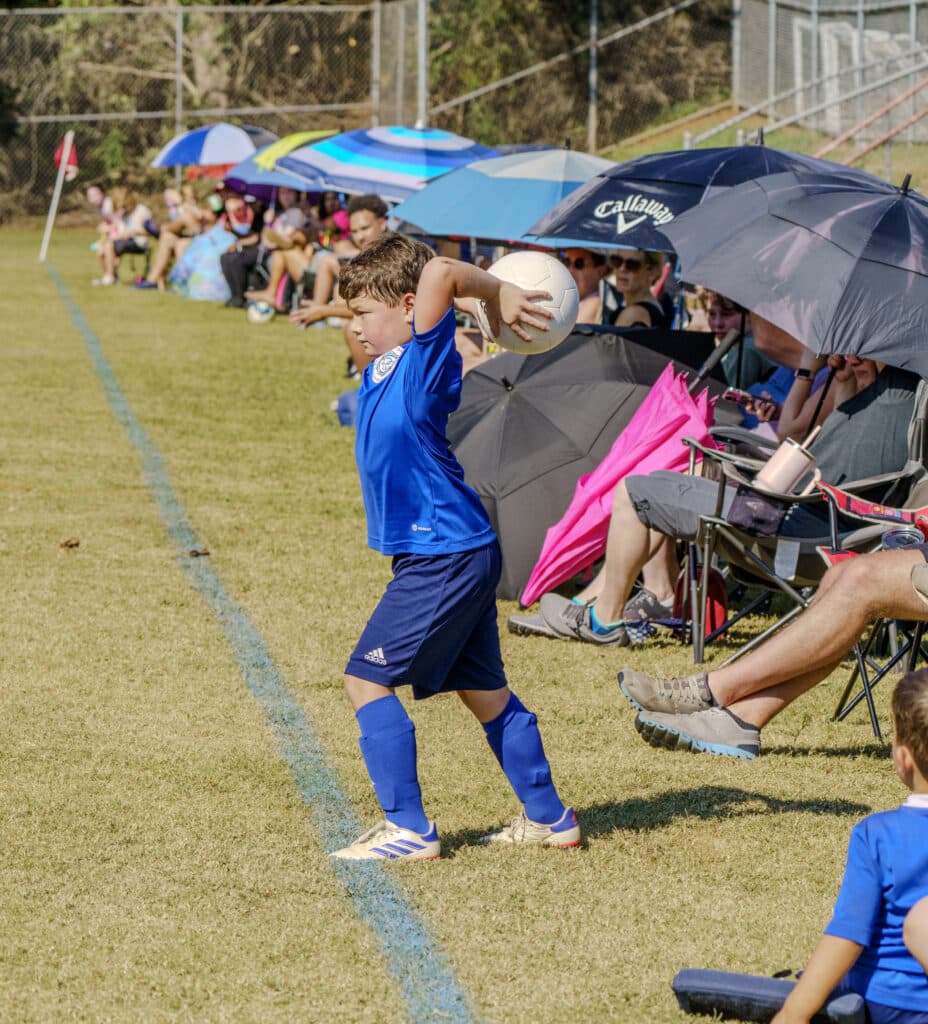
Right now, several clubs are using that space, so a huge obstacle is finding some place to play that’s local so that families won’t have to traipse all over the metro area.
“We don’t want to lose our identity by expanding too big, because that’s hard to manage,” he added.
Community engagement and future plans
Committee member Mathew Shamloo credits Meech with pulling him into the mix.
“I’d say that Gavin has a very unassuming gravitational pull,” he said. “There’s no real process to it. I think it’s just naturally the people who want to be involved step forward and, whether or not they are asked, they’re just kind of pulled in inch by inch.”
Shamloo is also a coach, but had no prior experience.
“I had no real ties to soccer before this,” he said. “My daughter wanted to play. My background is in basketball.”
So he utilized some of the fundamentals that apply to any team sport and researched best coaching practices.
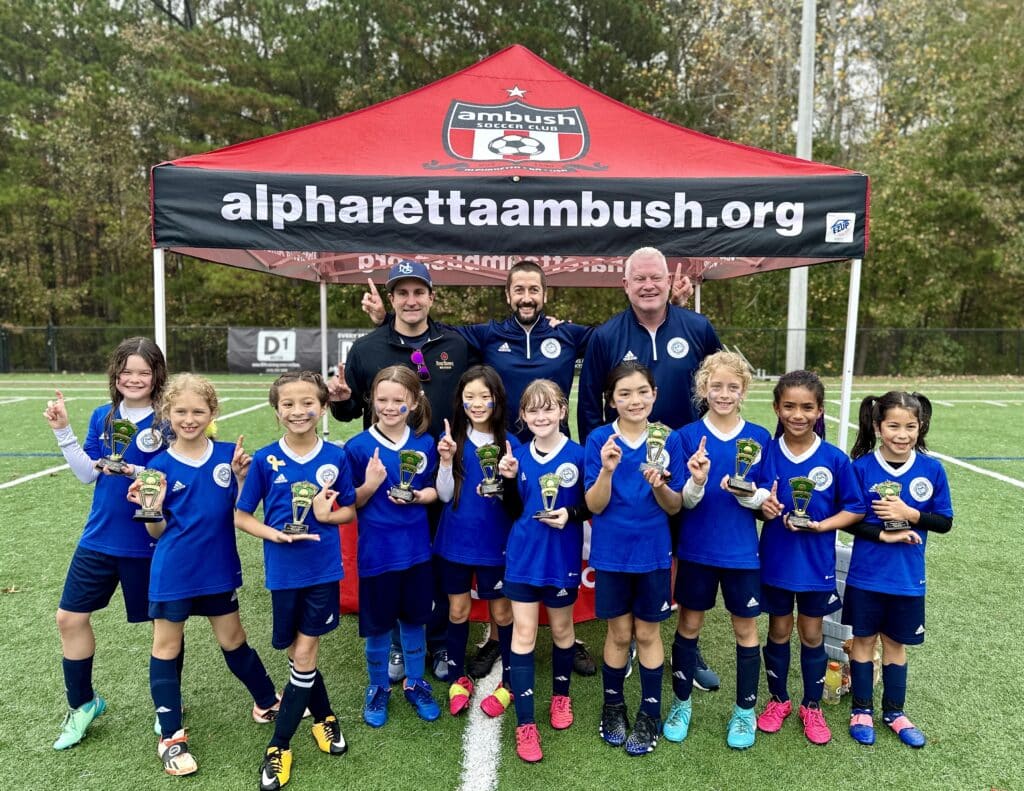
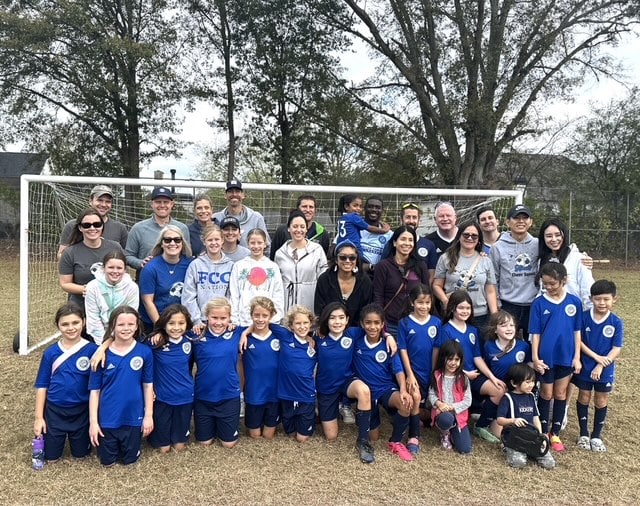
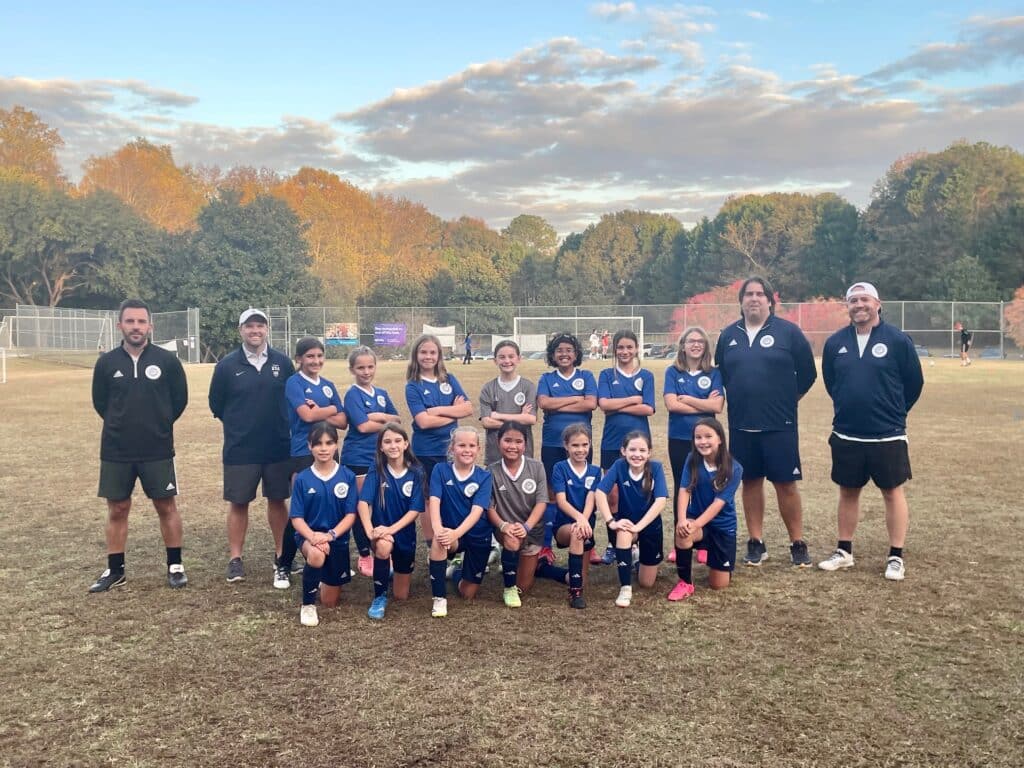
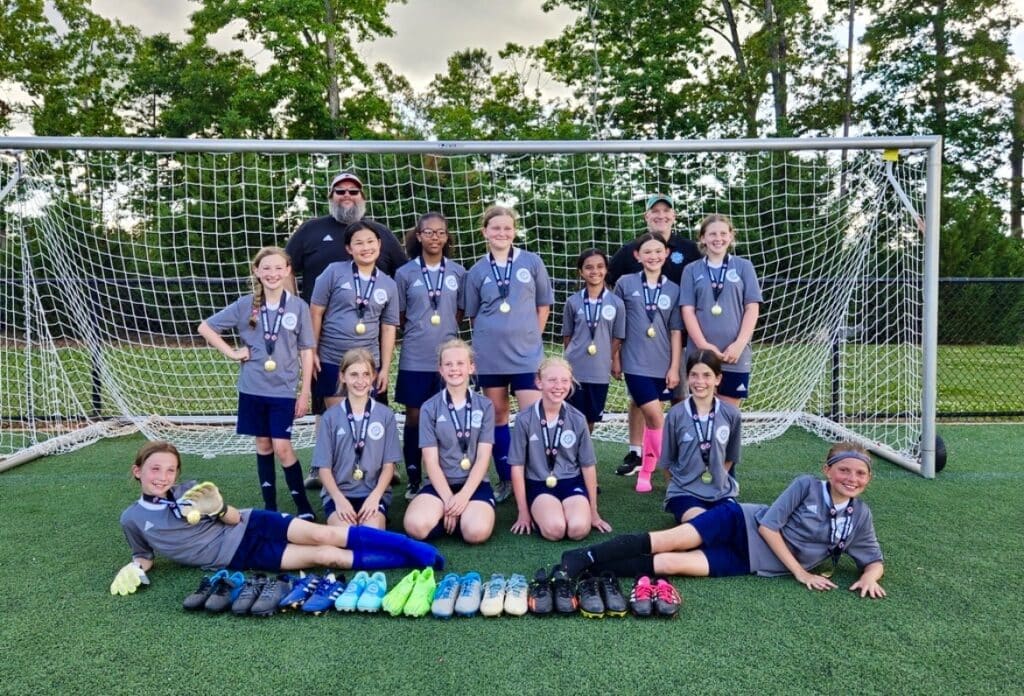
“I want her to play soccer because it’s easily accessible, it’s local, it’s right around the corner from us,” he said. “It was like, ‘Hey, there’s soccer. We can start there.’”
Like most parents, Meech and Shamloo don’t have dreams that their kids will turn into David Beckham or Brandi Chastain. But if the kids have those aspirations, PCFC has ties to bigger opportunities.
“I think what we’ve managed to achieve is we have raised the bar on rec sports, and we are able to compete, but we’re fundamentally a rec club,” said Meech. “I think some of the challenges of the past [are] where you get to a point where you say, ‘Well, should we become an academy? Should we offer the next level of competition to the kids?’ But sort of the mentality we’ve had, and kind of our foundation, is no, that Peachtree Corners is a local rec club.”
In order to keep doing what they do in an amateur Ted Lasso fashion and stay around for another 50 years, the club focuses on community and engagement with local businesses for partnerships rather than sponsorships.
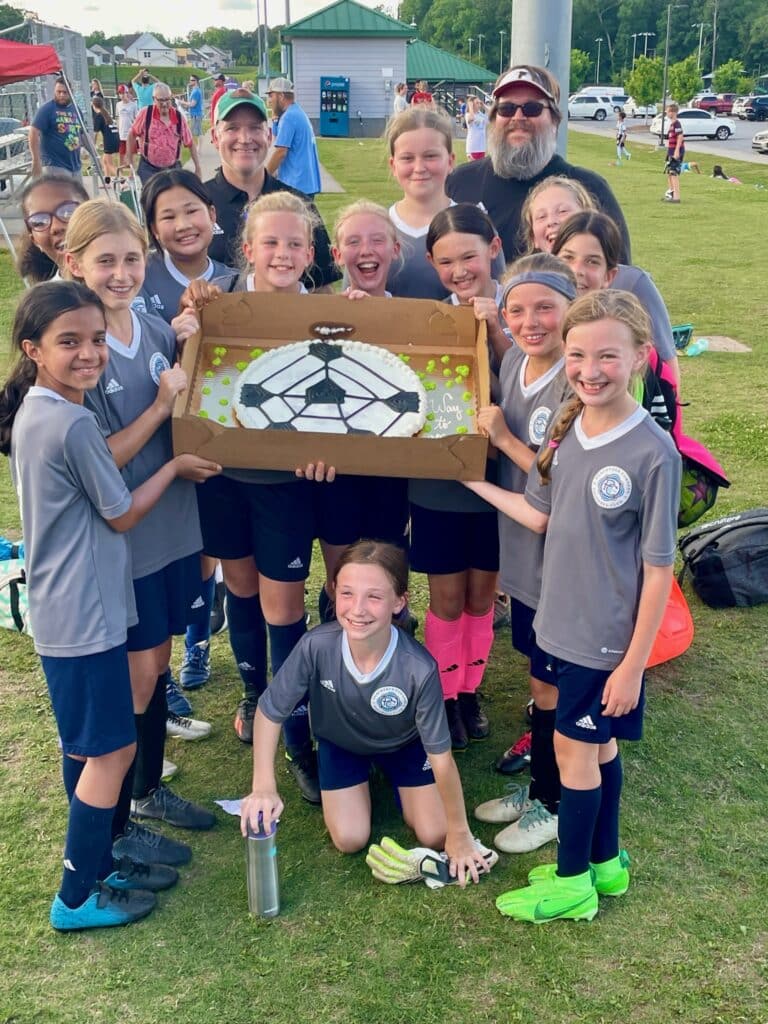
“Our soccer club and families are more than just a group of people that meet for our kids to play a sport,” said Meech. “Traditionally, you engage with local business for sponsorship, but we’re very lucky in the sense that, as a nonprofit supported by parks and rec with facilities, we don’t need a huge amount of sponsorship.”
Expanding the community
Soccer is easily accessible globally because all you need is a ball and a goal and some grass or something similar, so the costs are relatively low, he added.
“We’ve been able to engage with local restaurants, other sporting facilities and work in more of a partnership with them to create this wider community beyond Jones Bridge soccer playing fields,” he said.
Both men pointed out that they go to Town Center or other sporting events with their families and inevitably bump into Peachtree Corners FC players and family members everywhere.
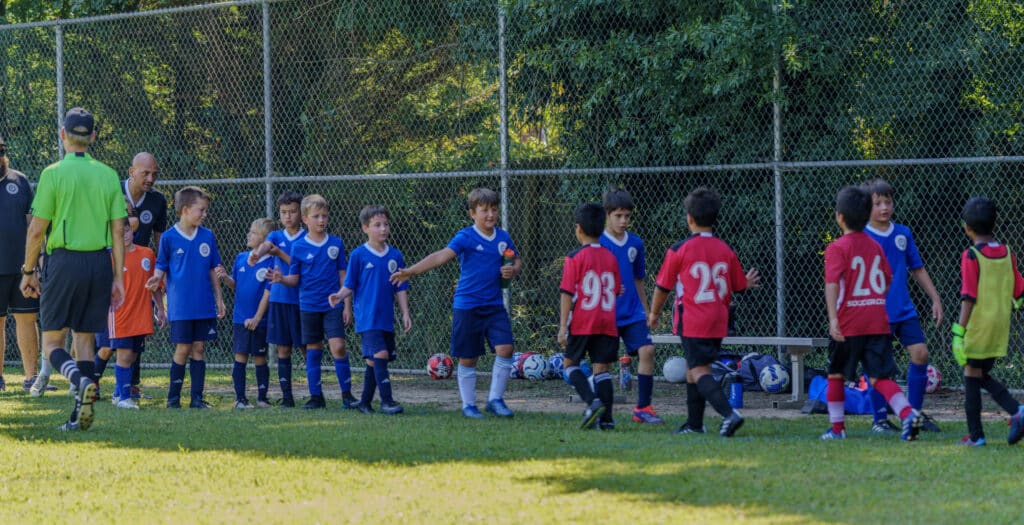
“Local businesses reach out to us and try and find out how they can contribute,” said Meech.
Although the club is at capacity, it still invites families and businesses to visit and see the activities firsthand. The committee members want to build awareness and community involvement, as the club aims to continue growing and providing a positive experience for all involved while maintaining its community-centric focus.
For more information about the Peachtree Corners Football Club, visit pcfcsoccer.com.
Related
Arlinda Smith Broady is part of the Boomerang Generation of Blacks that moved back to the South after their ancestors moved North. With approximately three decades of journalism experience (she doesn't look it), she's worked in tiny, minority-based newsrooms to major metropolitans. At every endeavor she brings professionalism, passion, pluck, and the desire to spread the news to the people.

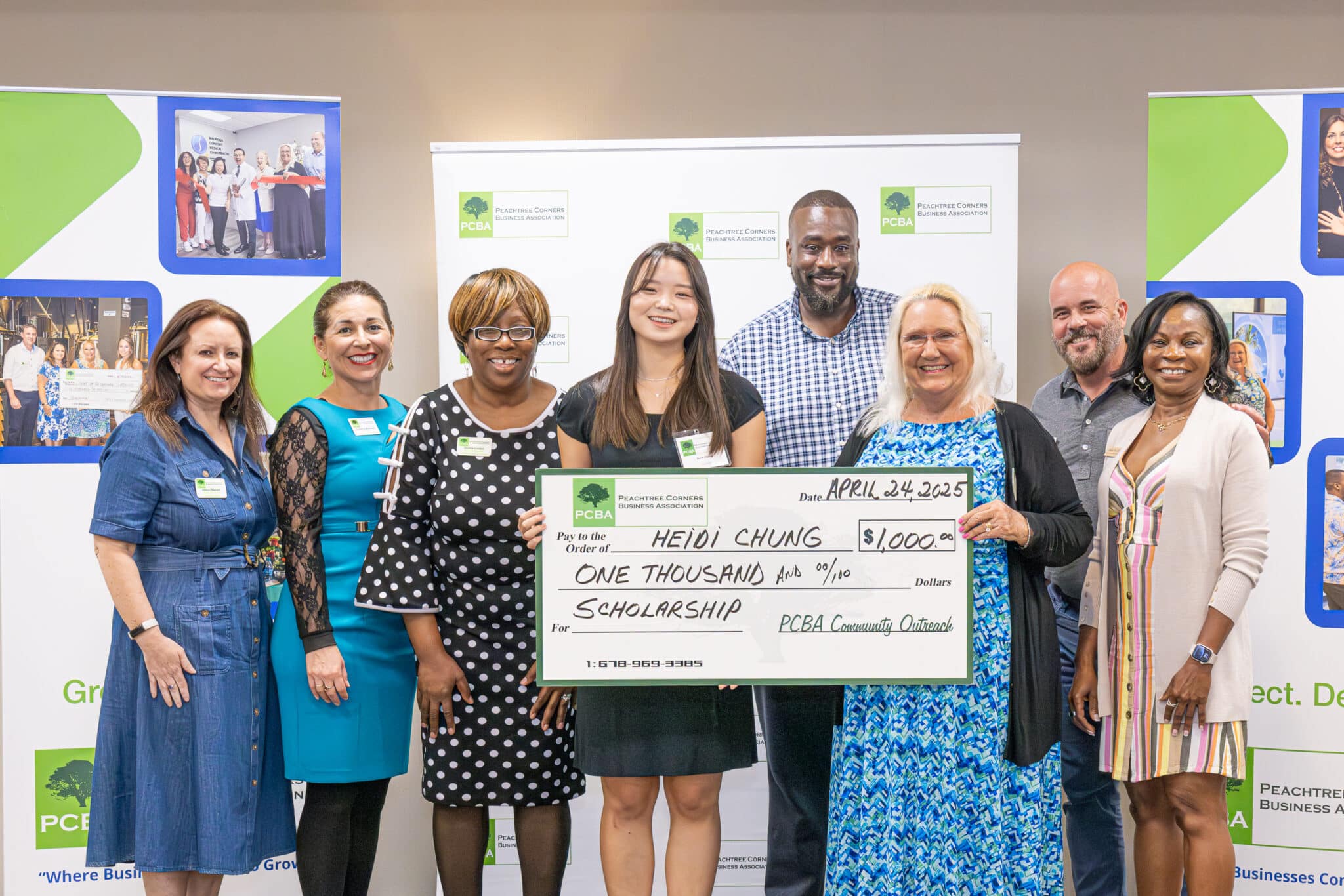
The Peachtree Corners Business Association (PCBA) awarded local high school senior, Heidi Chung, a $1,000 scholarship during their April 24 Business After Hours event. Heidi and her family were presented with the scholarship and introduced to the organization’s members and guests at the monthly gathering.
Heidi was accepted by several colleges and has selected the University of Kentucky to continue her education, pursuing a degree in nursing. When asked what lessons she has learned from her experiences volunteering and serving in the community throughout her life, Heidi commented, “I have learned that true leadership is about service, taking initiative and persevering through challenges.”
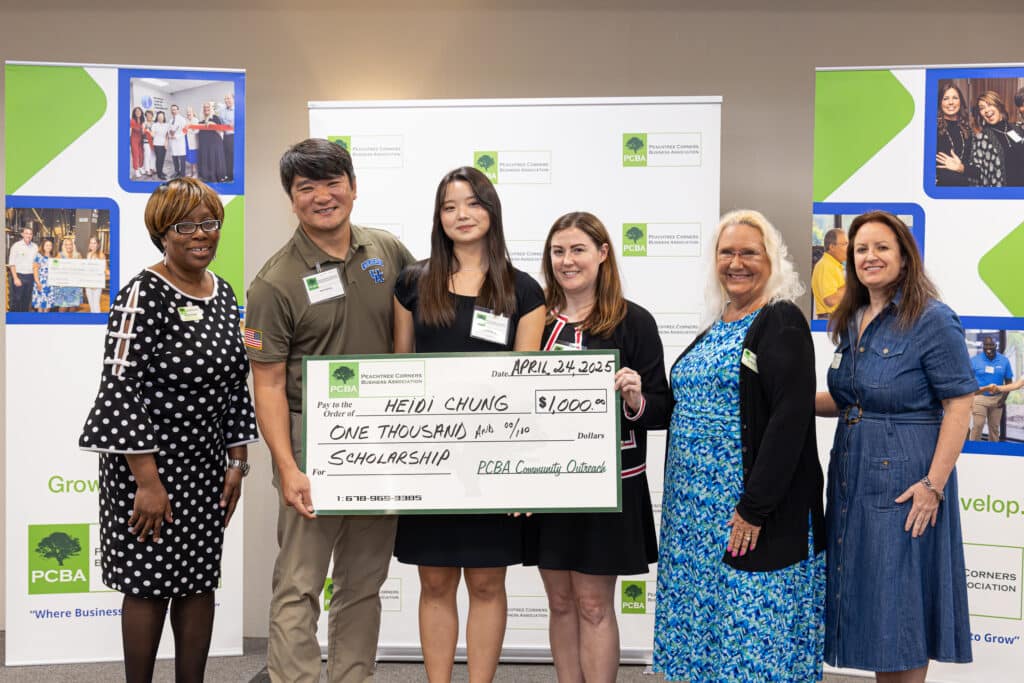
Scholarship Chair Donna Linden and Outreach Director Suzanna Martinez shared that the scholarship committee was impressed with Heidi’s many accomplishments, “whether she was organizing fundraisers, leading performance groups or helping athletes recover from injuries, Heidi demonstrated a positive impact on the community, as well as outstanding academic results.”
Funds for the PCBA Community Outreach Program are raised throughout the year from PCBA membership, sponsorship and an annual charity event. Donations and scholarships are awarded at PCBA’s monthly events so that members have the opportunity to learn more about the individuals and organizations.
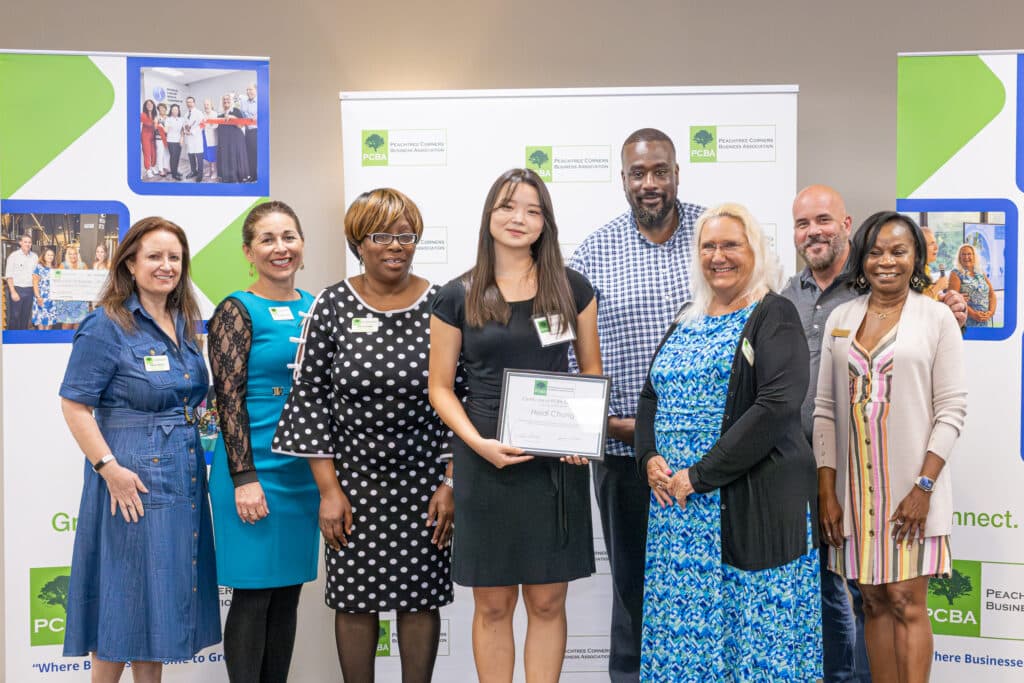
“We are so proud that the PCBA has … awarded 20 scholarships to outstanding future business leaders and donated in excess of $173,000 into our metro Atlanta community over the last 13 years,” stated Lisa Proctor, PCBA board president.
About Peachtree Corners Business Association
“Where Businesses Come to Grow,” the Peachtree Corners Business Association is a business membership organization that focuses on innovative approaches, programs, shared resources, community outreach and opportunities for member businesses and professionals to connect, develop, grow and prosper.
The PCBA is made up of businesses of all sizes and types who want to expand their reach and grow their business within Peachtree Corners and the greater metro Atlanta area.
For more information, call 678-969-3385, email membership@peachtreecornersba.com or visit peachtreecornersba.com.
Related
Community
Katherine Lafourcade — A Journey of Passion, Resilience and Giving Back
Published
6 days agoon
April 29, 2025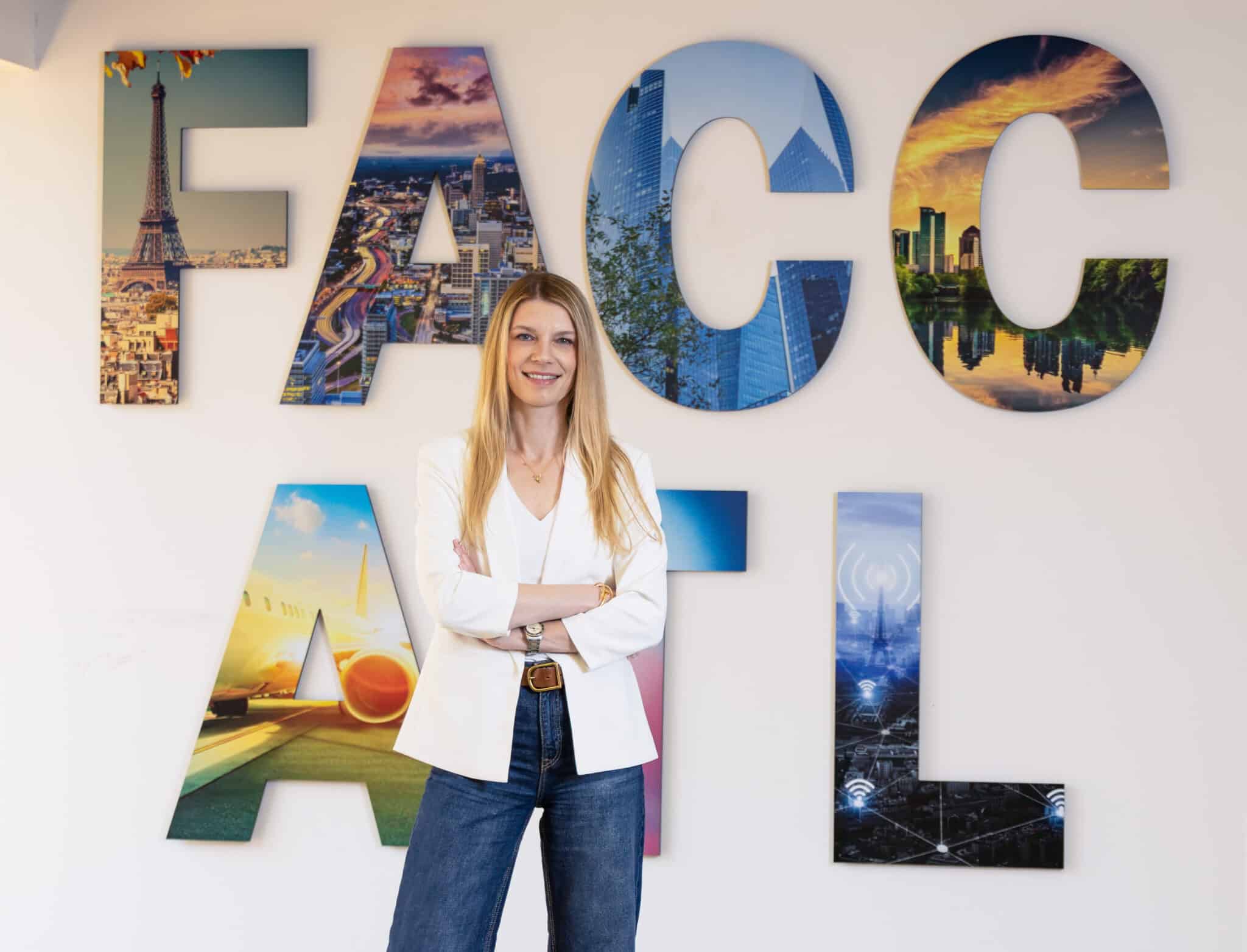
Katherine Lafourcade, executive director of the French American Chamber of Commerce Atlanta-Southeast (FAAC Atlanta-Southeast), located at Curiosity Lab Peachtree Corners, discovered her passion for French early in life.
As a schoolgirl in England, learning French ignited a spark in her. And by age 13 she’d informed her mother that she planned to be bilingual, live in France and marry a Frenchman. Later, armed with a degree in international business and French, she made her way to an internship in Paris, achieved fluency and did, in fact, eventually marry a Frenchman.
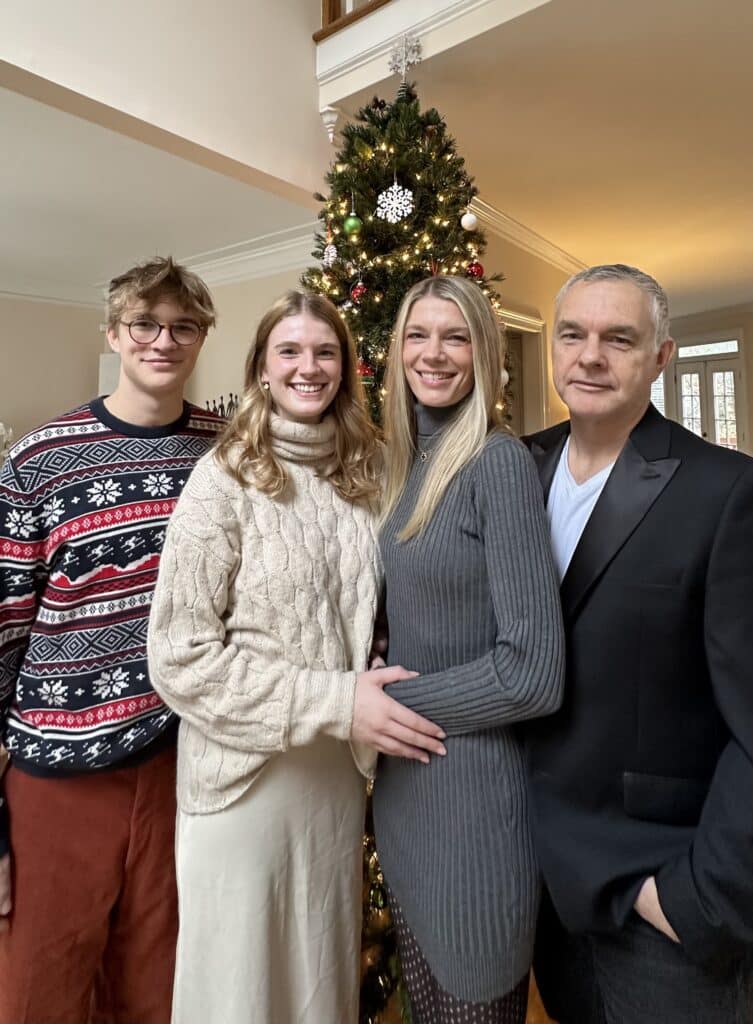
“I worked for 10 months in Paris for a defense company … in the purchasing department. I was basically learning French. I was an assistant, and it was very much French immersion,” Lafourcade recounts.
Having reached an important linguistic milestone, Lafourcade couldn’t wait to share the progress with her mother. “I rang her so excited one day, forgetting she was still teaching. […] They had to get her out of the classroom to come to the phone. All I wanted to tell her was that I’d had a dream in French,” she laughed.
Career moves and motherhood
Lafourcade held various jobs in Paris, then moved to Nantes on the west coast before a new opportunity led her to Geneva. She’d spend more than 15 years in Switzerland. It was there that she met Alain, her Frenchman, and had two children, Lina and Theo.
Balancing motherhood and a career was important to Lafourcade. While initially staying home with her young children, she soon sought a professional outlet.
“For me it was important to show my kids that mums are able to work and have professional roles,” she stated.
Entrepreneur
As women so often do, Lafourcade adapted to meet her family’s needs, but being a stay-at-home mom was not her long-term plan. “I did struggle at that point. […] It was difficult. […],” she confessed.
To work around their circumstances with young children, she and her British biochemist friend co-founded a French/English bilingual preschool, allowing for a business to flourish alongside their children.
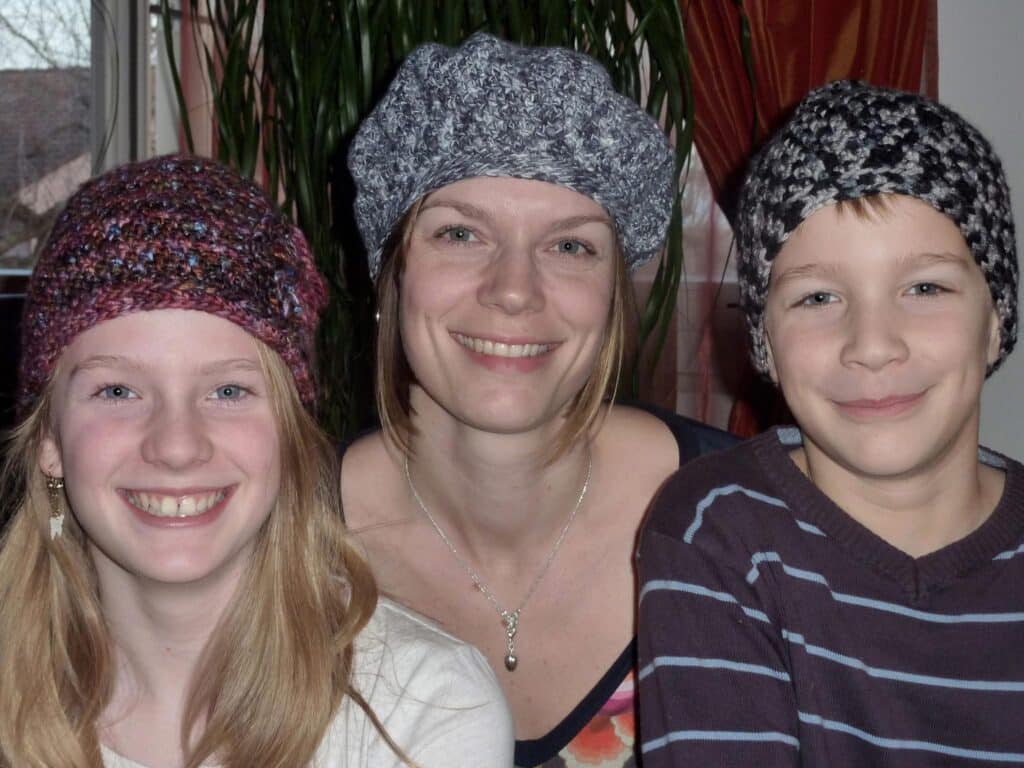
Naysayers suggesting they shouldn’t embark on this venture because they were women, mothers and expats only strengthened their resolve. They ran the successful business for five years, allowing their children to thrive with friends in a nurturing environment.
They secured an employee with early childhood education qualifications. Her friend oversaw the books and finances, and Lafourcade spearheaded communications.
“We were everything — the CEOs and the cleaners,” Lafourcade chuckled.
Once their children were older, the business was sold. Lafourcade then held jobs in recruitment, education (as administrative staff) and manufacturing. Her last job in Switzerland was with Nestlé for five years, serving as an executive assistant to the vice president of Nestlé Skin Health.
As varied as her roles have been, they share a common thread. “In all of my jobs, I’ve always found something where I can use both languages,” she said.
Disaster strikes
In December of 2016, 12-year-old Theo started getting sick. What began with mysterious symptoms like leg and chest pains increased in intensity to the point of tearful nights that landed him in the hospital with a low-grade fever during the family’s trip to the UK in early 2017.
“I’m sure he’ll be fine,” Lafourcade told herself as she spent a milestone birthday in the hospital while Theo underwent a battery of tests. In the meantime, Alain and Lina returned to Switzerland. Lafourcade and Theo stayed behind, hoping for answers that never came.
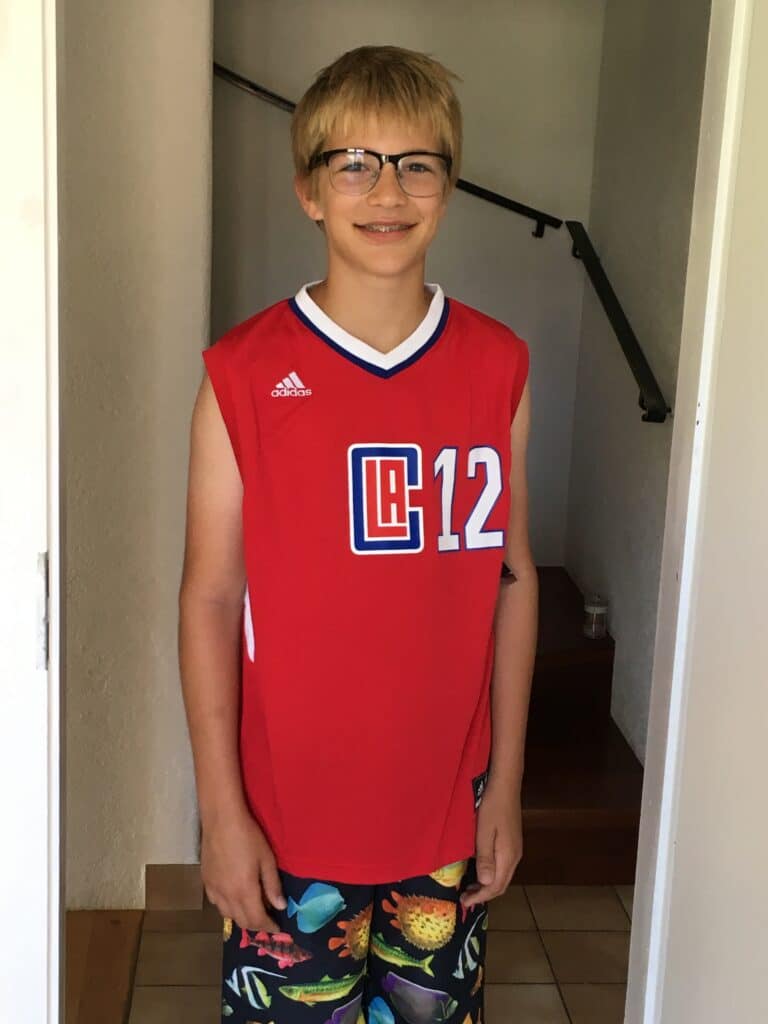
Ultimately, the decision was made to forward all lab results to Theo’s doctor in Switzerland and return home for further investigation. Lafourcade’s sister, a medical professional, reviewed the labs and harbored concerns.
Amidst uncertainty, Lafourcade took Theo, unwell and tired of being poked and prodded, to the pediatrician upon their return.
After cautioning everyone to remain calm, the doctor’s demeanor changed upon feeling Theo’s enlarged spleen, sending them to the hospital immediately.
It’s leukemia
Reliving the trauma, Lafourcade felt the emotions of Friday, January 13, 2017, surface. The diagnosis was acute lymphoblastic leukemia (ALL). Chemotherapy treatments began that same day.
“You don’t get the words that are being said,” Lafourcade confided. “It feels absolutely impossible. This is your healthy, happy, normal kid. How have we gone from that to cancer?”
The port placed in Theo’s chest remained there for the duration of his grueling treatment protocol — over three and a half years.
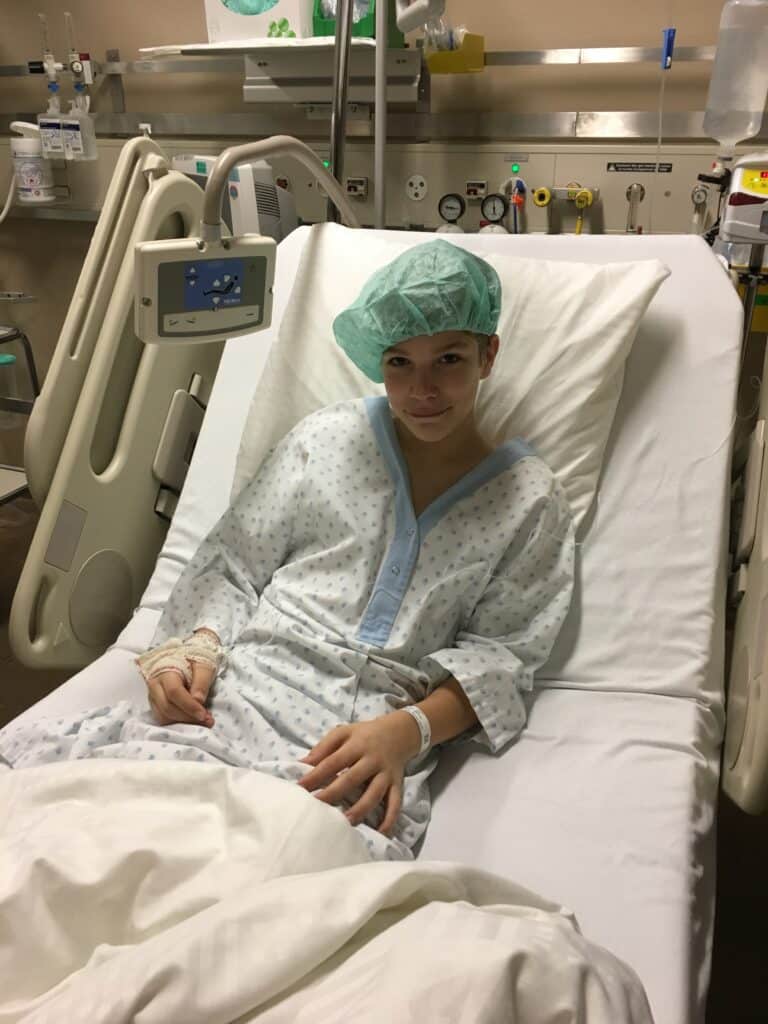
“Leukemia is tough. You learn a lot very quickly because you’re kind of put on this crazy train going 100 miles an hour,” Lafourcade shared.
Leukemia originates in the bone marrow where a single white blood cell undergoes a mutation and multiplies, triggering abnormal growth and division. The proliferation of abnormal cells crowds out healthy white and red blood cells and platelets.
Lafourcade explained, “Normally white cells defend the body. They’re part of your immune system. Once they’ve mutated, they don’t defend anything. They multiply much too fast, and they don’t die quickly enough.”
Phase one
It was the buildup of leukemia cells within Theo’s bones, especially large bones like the sternum and femur, which created massive pressure and pain. Chemotherapy alleviated his discomfort. However, this intensive phase of treatment made school difficult and brought with it all the usual side effects: hair loss, nausea and lethargy.
Lafourcade speaks highly of the care Theo received at the CHUV: Centre Hospitalier Universitaire Vaudois. There, a cocktail of drugs was administered one to four times weekly; some administered into the port, some in a 24-hour drip requiring overnight stays. Others required days of saline pre- and post-hydration to avoid an assault on his organs.
As for Theo’s mood, Lafourcade recalls when he’d had enough. “You have to imagine a 12 and a half, 13-year-old. […] At one point he told me he wanted to die. He said, ‘I don’t want to do this anymore.’ It was horrendous for all of us.”
Constantly in and out of the hospital, Lafourcade was unable to work. Her team at Nestlé took on her workload and checked on her regularly.
When the easy part is hard
Nine months into Theo’s relentless treatment, the Lafourcades anticipated the simpler “maintenance” phase, but things unfortunately took a turn for the worse. Frantic testing revealed an intestinal parasite wreaking havoc on Theo’s already weakened immune system.
There was no rest for mother or son. Lafourcade logged each time he vomited or went to the bathroom — up to 15 times per night. Theo was in agony. When the infection spread to his bloodstream, septicemia took hold. His blood pressure was crashing.
“His lungs got the majority of the infection, so there was not enough oxygen getting from his lungs into his blood system,” Lafourcade explained.
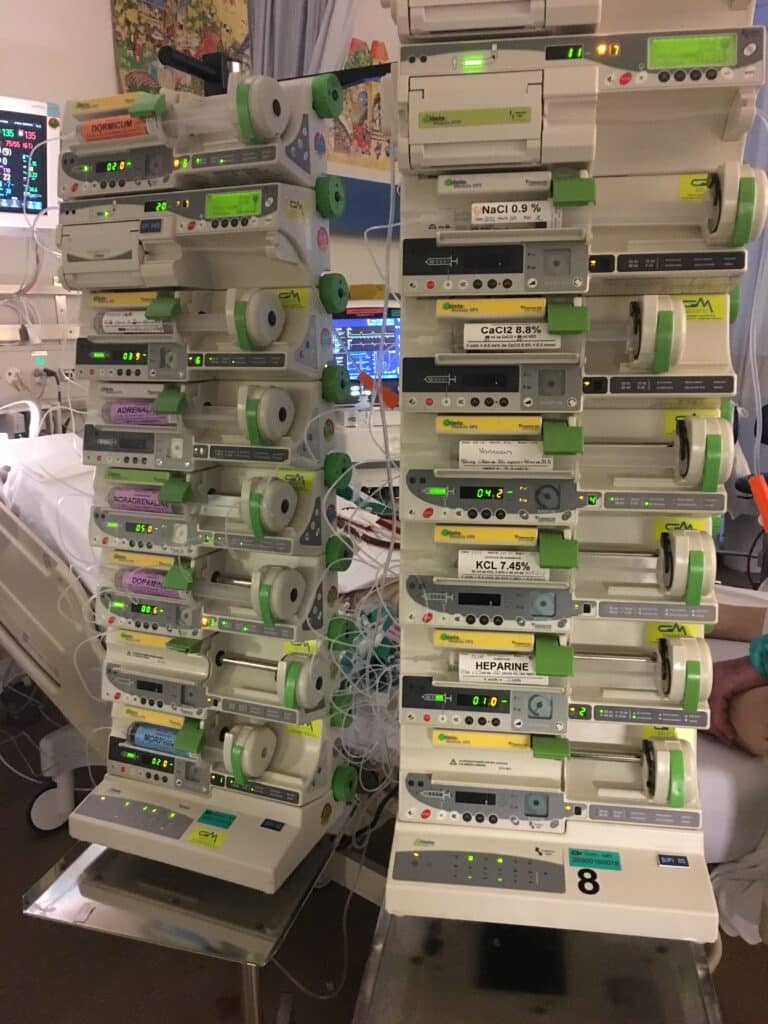
In coma
As a last resort, Theo was placed in a coma and put on extracorporeal membrane oxygenation (ECMO) life support. Mimicking the functions of the heart and lungs, the machine adds oxygen to and removes carbon dioxide from the blood outside of the body and then sends it back into circulation.
“It’s brutal. It’s like open heart surgery. You put two tubes directly onto the heart,” Lafourcade said. At the same time, Theo was on a ventilator for breathing, on dialysis for his failing kidneys and had a tracheotomy to prevent damage to his vocal cords due to extended intubation.
“The machine kept him alive for over three weeks, […] Normally people don’t go on that machine for long because the body is only able to cope with the blood going through this kind of machinery for a short period of time.”
In fact, Theo hemorrhaged multiple times. He needed more blood, fast. Lafourcade recalls doctors sounding an alarm while yelling, “He is empty!” Then she watched as large syringes of blood were injected into tubes connected to his body to boost his blood volume.
A mother’s voice
Having heard that maternal voices can comfort patients and improve their condition, Lafourcade sat by Theo’s side reading to him for the better part of three weeks.
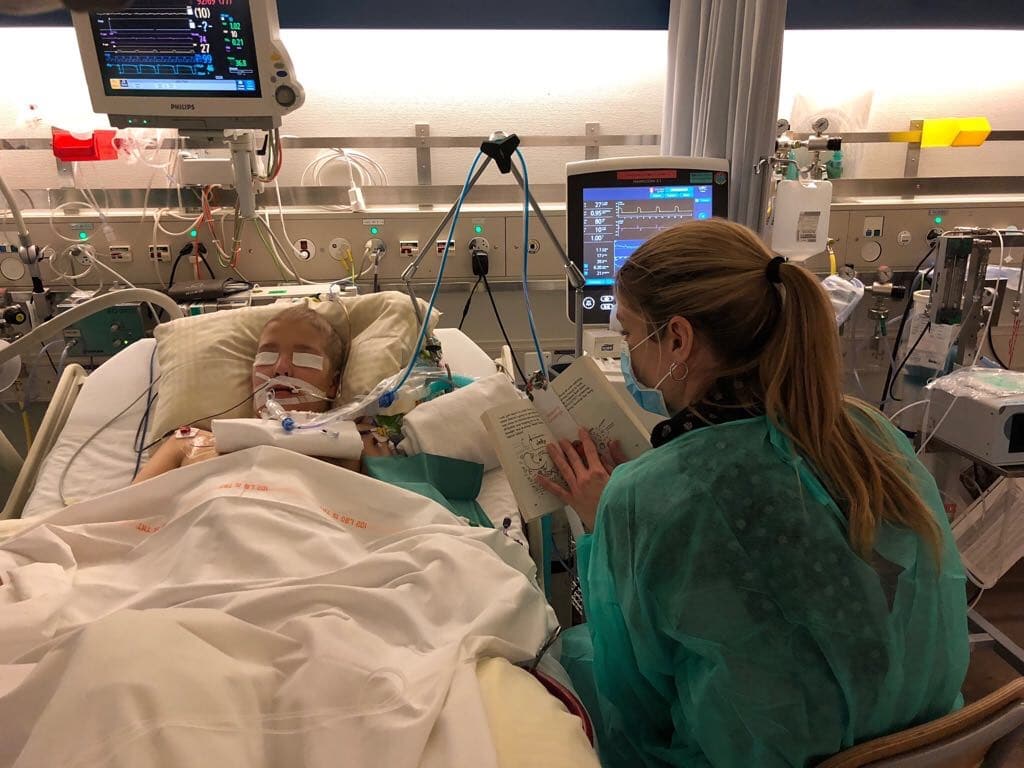
During times when Theo seemed to be “closer to the surface,” his heartrate increased and he exhibited twitching or facial movements. As Lafourcade read to him, she noticed that his agitation would subside.
A rude but astonishing awakening
It was a harrowing decision to take Theo off life support in January. Doctors weren’t sure his heart and lungs could withstand it. He bled profusely, requiring another blood transfusion, but miraculously, he made it.
After nine months of feeling terrible from chemotherapy and being assured it would get easier, he was angry when he woke up. Things were not better.
He’d lost so much muscle mass he could barely sit up. His body was riddled with pressure sores from having been immobile. “He was a little skeleton who couldn’t speak because of the tracheotomy. He was furious. All I could see was this fist by the side of his bed,” Lafourcade recalled.
It took months of daily physiotherapy for Theo to relearn how to sit, stand, walk and grip a pencil.
Coming to America
Just as Theo was transitioning out of the ICU, Alain was offered a position abroad.
“We both said, ‘This feels like something we should look at,’” Lafourcade said. They discussed it with Theo’s doctors first.
They learned that the treatment protocol for leukemia in the U.S. is identical to that of Switzerland. Moreover, his doctors felt the move would benefit Theo psychologically.
The next step was talk to their kids. “I hadn’t even finished my sentence when I was asking Theo, who was 15 at this point and he said, ‘I want to go tomorrow.’”
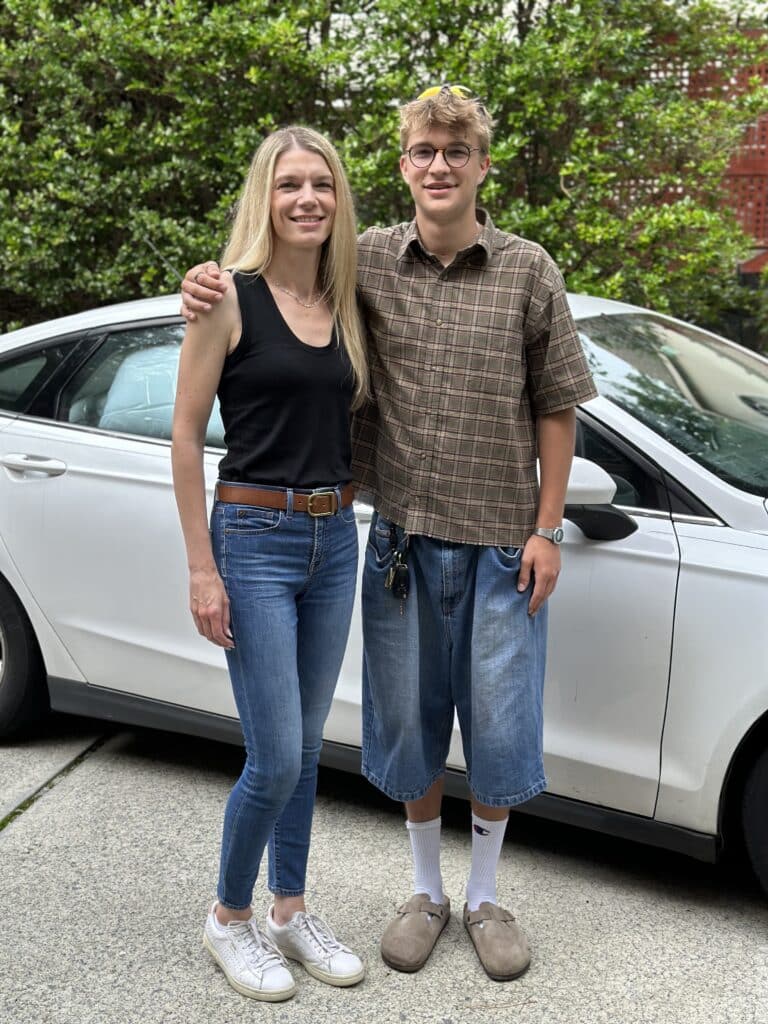
Lafourcade believes it was the ultimate opportunity for him to leave the nightmare behind and start afresh. Unfortunately, Lina was not as enthusiastic about leaving Switzerland during her senior high school year.
In the U.S., Theo continued his treatment at Children’s Healthcare of Atlanta Scottish Rite Hospital. Lafourcade trusted the capable doctors there implicitly. The American doctors simply picked up where their Swiss counterparts had left off.
Theo rang the bell at the end of his treatment in May 2020, making May of this year a particularly important anniversary. After five years, the likelihood of recurrence is significantly lower. Today, Theo is a sophomore at UGA, interested in studying medicine because he wants to give back.
Boss lady and super mom
The Lafourcades joined the FACC Atlanta upon moving to the U.S. to connect with the French community here. At the gala event of 2021 it was announced that the executive director would be returning to Europe. Acquaintances suggested Lafourcade was made for the job.
The position involves speaking French; it instantly sparked her interest. After doing some research about the role, the nature of non-profit organizations and the mission of the chamber, Lafourcade concluded it would be a good fit. She started in January of 2022.
There was some juggling of car rides, study help and college visits. “You have to be clever with the hours you work. The chamber isn’t a [traditional] 9-to-5. There’s a lot of afterwork stuff. It can be a fairly unusual time frame that I work within, especially with France, you’ve got the six hour time difference,” Lafourcade shared.
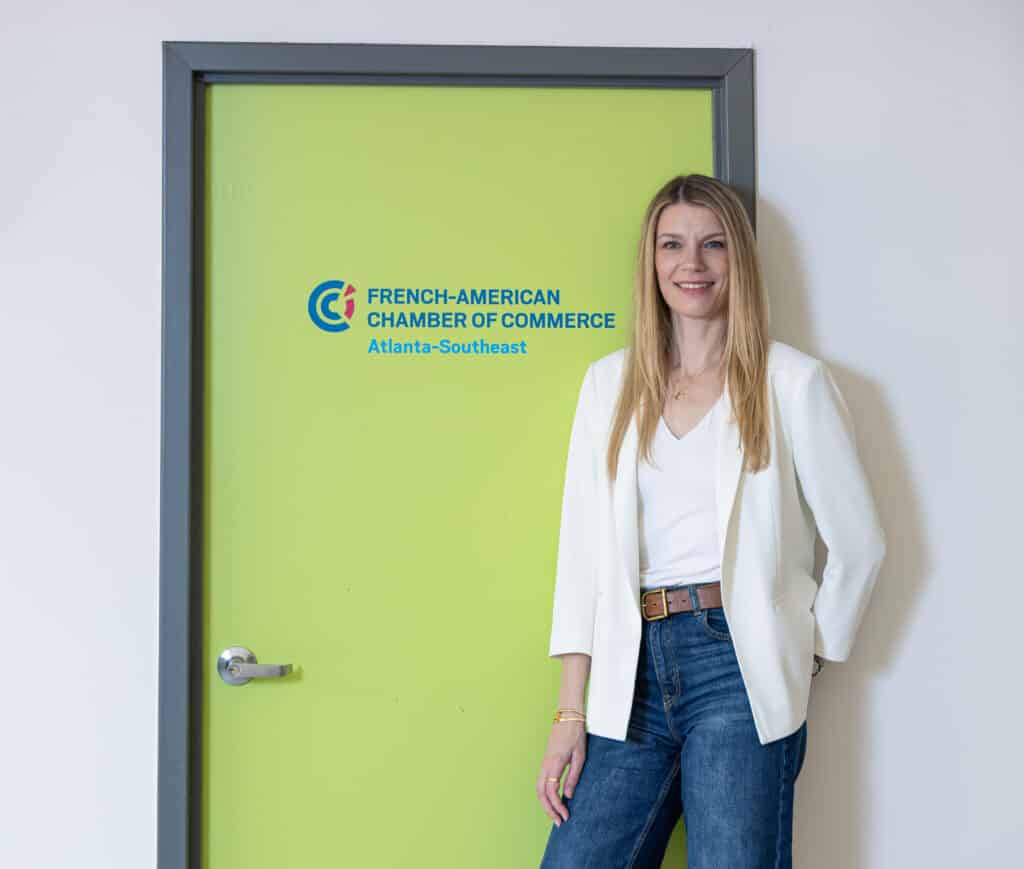
She considers herself lucky to have more flexibility than she would in a typical office environment. Some days are long, but her children see the value in what she does, and that motivates Lafourcade.
Her vision is for the chamber to be the “go-to” for any French companies here, all Francophiles in Atlanta and any French companies moving in. She collaborates closely with The Alliance Française and the French Consulate to support the vibrant French community in metro Atlanta.
According to Lafourcade, board members have noted the chamber’s improved position under her leadership over the past three years.
The FACC Atlanta-Southeast was founded in 1985. After highs, lows and multiple changes, they celebrated 40 years this past February. “We’re looking to go onward and upward,” Lafourcade smiled.
Despite talks of tariffs creating challenges, the FACC’s mission remains the same: to provide a soft landing for French companies establishing themselves in the region.
The floodgates open
In May 2022, a significant change occurred: the Food and Drug Administration lifted the “mad cow” (variant Creutzfeldt-Jakob disease) restrictions on blood donation for people who had lived or traveled in the United Kingdom, France and Ireland from 1980 onward. The Lafourcades were delighted; they were finally eligible to donate.
“It’s the notion of giving back, it’s community, it’s people in need,” Lafourcade said. “I never thought that I would be in a situation where anonymous blood donors would save my son’s life. And yet, that’s what happened.”
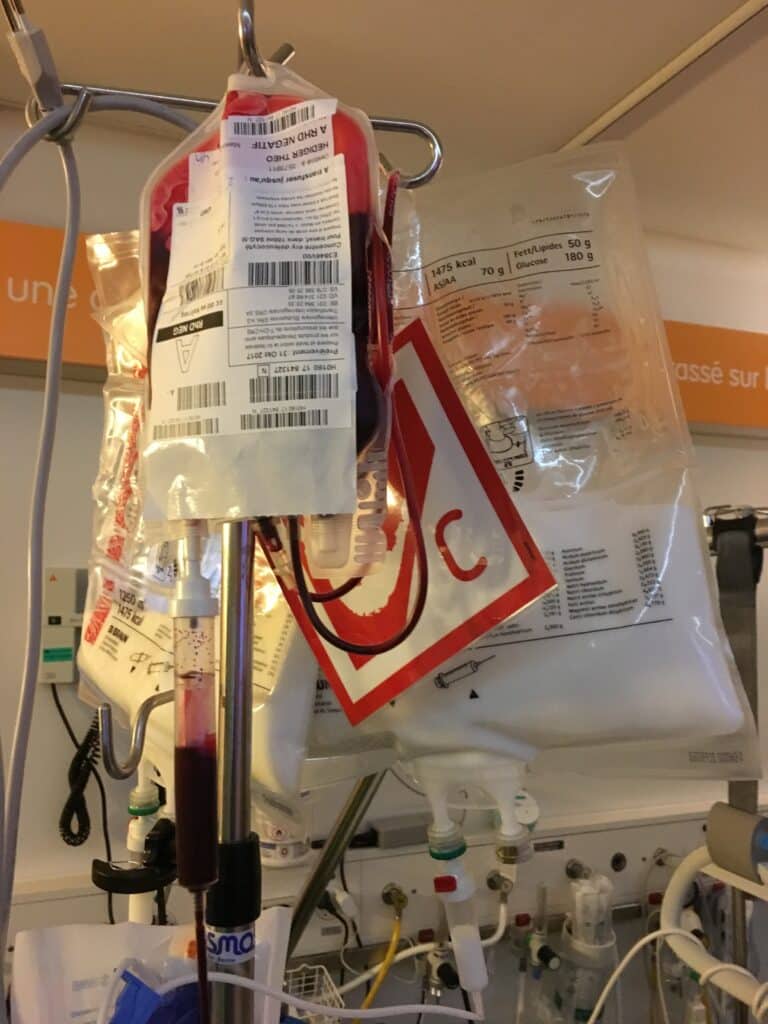
Although it may be human nature to think this type of misfortune only befalls others, Lafourcade feels we must ask ourselves, “What if one day it’s you or your child?” Because human blood can’t be manufactured, we’ll always depend on people’s generosity for it.
Initially, she alerted members of the FACC Atlanta that the rules of blood donation had changed for them. “I’m going to use my voice as the leader of the chamber to get the word out. One side of it is the expat community. Another side is people stopped donating during COVID and haven’t gotten back to it,” she shared.
Lafourcade believes her story can serve to strengthen a sense of community, particularly in a world feeling increasingly uncertain. “We’re in such a weird world right now where everything is scary, and people don’t know what the future holds,” she said.

She focuses on tangible actions people can take to quell that dreadful feeling of helplessness. And, having been on the receiving end of this life-saving practice, she wishes to inspire others to donate.
“Giving blood is free! You can do it several times a year and you will for a fact be helping somebody. It’s a case of helping your neighbor and doing something good if you can.”
Raising awareness
Turning trauma into positive action, Lafourcade feels a sense of duty to host blood drives. My husband and I were donors at her first one last September.
It was a painless, streamlined process. Snacks and refreshments were generously provided. Meeting community members and greeting Lafourcade were perks.
“The first one that you came to … we did a great job. Our goal for the drive was 18 units and we smashed that, we got 34 units,” Lafourcade beamed.
To spread the word beyond the FACC, she is now reaching out to the communities in which she lives and works — Johns Creek and Peachtree Corners respectively — to share her experience and encourage participation.
World Blood Donor Day
Lafourcade is hosting her next Red Cross Blood Drive at Curiosity Lab on World Blood Donor Day, Saturday, June 14, from 11:30 a.m. to 4:30 p.m., and encourages residents to help in whatever way they can.
“I want everybody in Peachtree Corners thinking, ‘I want to do my part.’ If people can’t give blood they can volunteer or help spread the word,” she said.
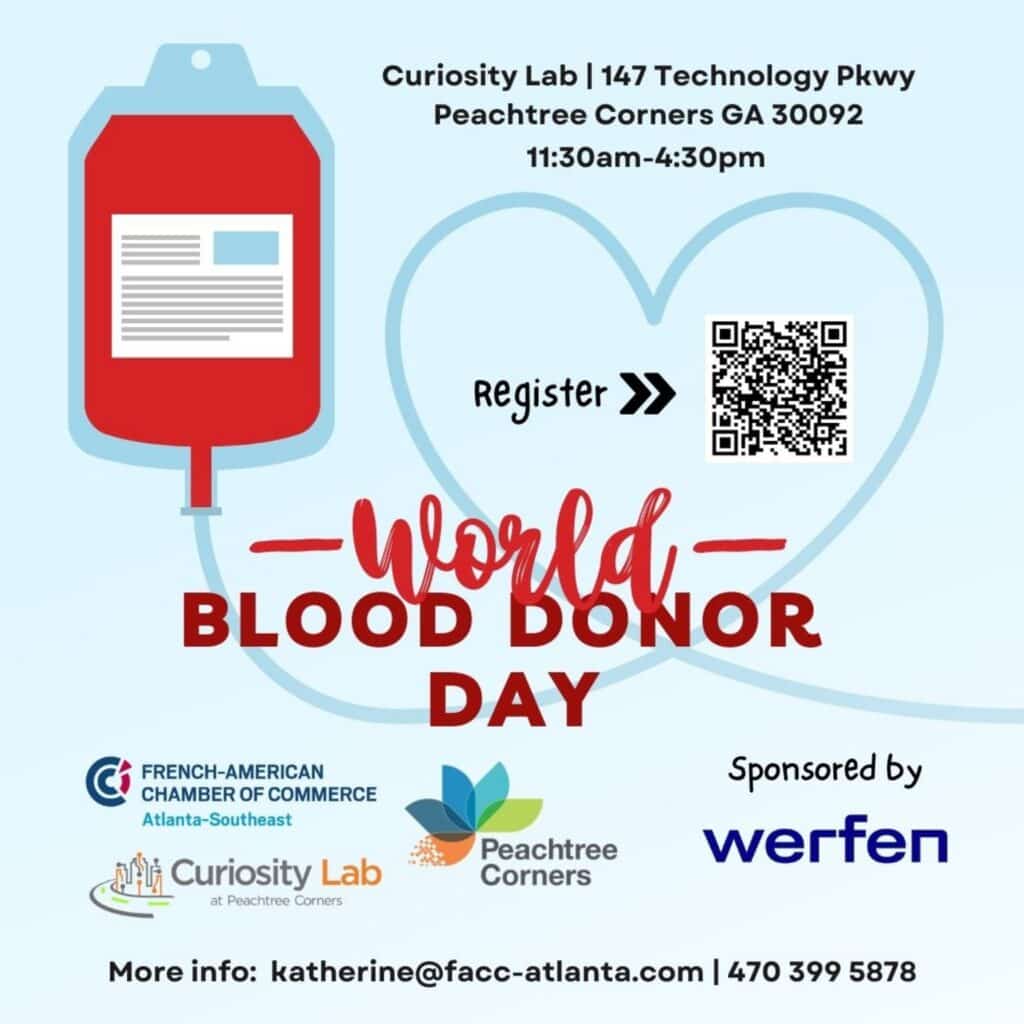
You can sign up to donate on the FACC Atlanta website or download the American Red Cross Blood Donor app to schedule and manage appointments and follow your blood’s journey to see where it gets used.
A woman in leadership
Katherine Lafourcade — executive director of the French American Chamber of Commerce Atlanta–Southeast, a passionate advocate for cultural and business exchange and a resilient mother — has journeyed from a schoolgirl captivated by the French language to leading a prominent bi-national organization.
Her story is one of determination, adaptability and turning profound personal challenges into a powerful force for good.
For more about the FACC Atlanta-Southeast or to sign up for the June blood drive, visit facc-atlanta.com. You can also connect with the organization on LinkedIn.
Related
City Government
The Future of Law Enforcement in Peachtree Corners: Community Meeting
Published
3 weeks agoon
April 14, 2025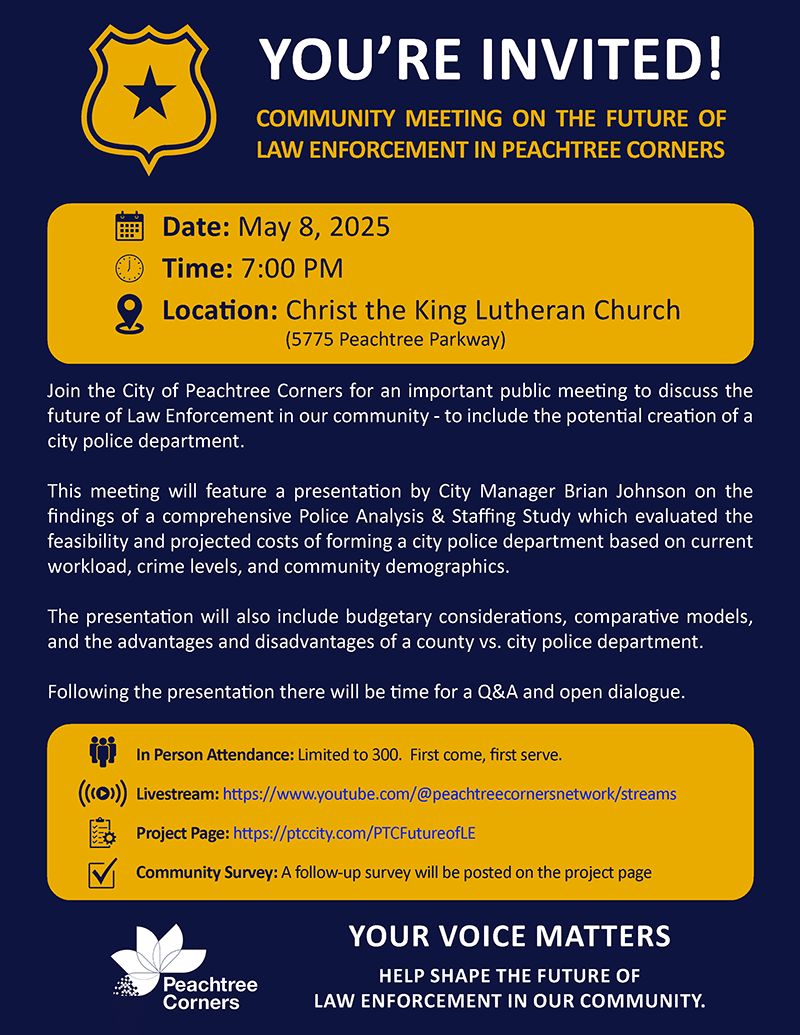
The City of Peachtree Corners will hold an important public meeting on May 8 to discuss the future of law enforcement in our community — including the potential creation of a city police department.
This meeting will feature a presentation by City Manager Brian Johnson on the findings of a comprehensive Police Analysis & Staffing Study that evaluated the feasibility and projected costs of forming a city police department based on current workload, crime levels and community demographics.
The presentation will also include budgetary considerations, comparative models and the advantages and disadvantages of a county vs. city police department.
Following the presentation, there will be time for a Q&A and open dialogue.
In-person attendance is limited to 300. First come, first served. A livestream option will be available for those who can’t attend in person.
After the meeting, a follow-up survey will be available on the city’s project page.
Meeting details
The Future of Law Enforcement in Peachtree Corners
Date/Time: May 8, 2025 at 7 p.m.
Location: Christ the King Lutheran Church (5775 Peachtree Parkway)
For more information, visit peachtreecornersga.gov.
Related
Read the Digital Edition
Subscribe
Keep Up With Peachtree Corners News
Join our mailing list to receive the latest news and updates from our team.
You have Successfully Subscribed!

GA Tech, Peachtree Corners Solidify Partnership with First-of-its-Kind Venue

Peachtree Corners City Guide 2025: Spring/Summer Digital Edition

Two Peachtree Corners Business Leaders Named Finalists for EY Entrepreneur Award

GA Tech Launches First-of-its-Kind GT Atrium in Peachtree Corners

Katherine Lafourcade — A Journey of Passion, Resilience and Giving Back

PCBA Announces 2025 Scholarship Winner

Paul Duke STEM High School Student Earns CGO Scholarship

Digital Edition

Digital Edition

World Blood Donor Day Starts Here: Theo’s Miracle, Katherine’s Mission [Podcast]

Paul Duke STEM High School Student Earns CGO Scholarship

PCBA Announces 2025 Scholarship Winner

Katherine Lafourcade — A Journey of Passion, Resilience and Giving Back

GA Tech Launches First-of-its-Kind GT Atrium in Peachtree Corners

Peachtree Corners City Guide 2025: Spring/Summer Digital Edition

Two Peachtree Corners Business Leaders Named Finalists for EY Entrepreneur Award

Light up the Corners [Video]

Capitalist Sage: Business Leadership in Your Community [Podcast]

Cliff Bramble: A Culinary Adventure through Italy

Top 10 Brunch Places in Gwinnett County

A Hunger for Hospitality

THE CORNERS EPISODE 3 – BLAXICAN PART 1

Top 10 Indoor Things To Do This Winter

The ED Hour: What it takes to Remove Barriers from Education



